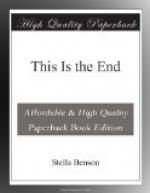Mr. Russell, on second thoughts, was glad he had been interrupted. He did not feel discouraged, only he decided not to try again. His Hound jumped on to his knee and put a paw into his hand.
“I also persuaded a woman to give up drink,” continued Mrs. Gustus. “I put it to her on the ground of simplicity. She was in bed, having been drunk the night before, and I sat on her bed with my hand on hers. I said, ’Dear fellow-woman, there are no essentials in life but bread and water and love. Everything else is a sort of skin-disease which has appeared on the surface of Nature, a disease which we call civilization.’ She cried bitterly, and I gathered that she was lacking in all three essentials. I went and bought her four loaves of bread, on condition she would promise never to touch intoxicants again. I said I would not go away until she promised. She promised. I left her still crying.”
Cousin Gustus sighed. He never went about himself, and only saw the world through his wife’s eyes. This did not tend to cure his pessimism.
“It is wonderful how one can reach the bed-rock of life in two hours among the poor and simple,” said Mrs. Gustus. “By the way, I only put in two hours to-day, because I think I can do better work in two hours twice a week than in four hours once. So I shall come up for the afternoon one day this week from wherever we are by then, and leave you three men prostrate on some shore, with your ears to Nature, like a child’s ear to a shell.”
She groped for her notebook.
“I must come up now and then too,” said Mr. Russell, and poked his Hound secretly in the ribs.
* * * * *
I can’t tell you what countless miles away his ’bus-conductor was by now. A certain fraction of her, to be sure, was sitting in the dark room at Number Eighteen Mabel Place, Brown Borough, with fierce hands pinching the table-cloth, and a hot forehead on the table. All day long the thirst for a secret journey had been in her throat. All day long the elaborate tangle of London had made difficult her way, but she had kicked aside the snare now, and her free feet were on the step of the House by the Sea.
No voices met her at the door, the hall was empty. The firelight pencilled in gold the edges of the wooden figure that presided over the stairs. I think I told you about that figure. I never knew whose it was—a saint’s I think, but her virtuous expression was marred by her broken nose, and the finger with which she had once pointed to Heaven was also broken. Her figure was rather stiff, and so were her draperies, which fell in straight folds to her blocklike feet. Her right hand was raised high, and her left was held alertly away from her side and had unseparated fingers. She had seen a great procession of generations pass her pedestal, but she never saw Jay. Of course not, for Jay was not there. Only a column of thin watching air haunted the House.




